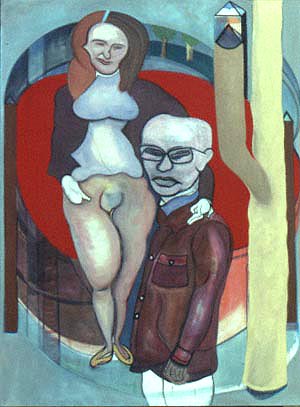|
Let’s get back to those troublesome words. ‘Spade,’ ‘girl’ and the rest. You see, I don’t believe that it’s the words themselves that bother us. It’s not actually that simple. Blackburn persistently and chronically details his — yes, exactly — dehumanizing erotic fantasies. He mentally undresses women he sees on the street without a single TRACE of shame. (Of course, not one of us ever looks at a stranger’s crotch, or down a dress, or wonders, hmmm. None of us has ever gotten an overpowering hit from someone we simply pass by. It just isn’t done!)
I don’t know anyone who has written about shitting as Paul does, also chronically (maybe Mozart), with the easy assumption that both writer and reader can admit that shitting is interesting, that it’s something a person thinks about, takes some pleasure in doing, and recognizes as a ready index to one’s general state of being. Even though current poetic practice gives us all permission to talk freely, even though that attitude toward shitting has the imprimatur of the Buddhists. Blackburn shits and writes about it. And he simply addresses an aspect of sex that’s very troublesome to us: Fucking as release; sex, fantasy or not, as not connected, intrinsically, to a personal relationship. Meat. He worships Mary and he wants his meat.
He doesn’t just do this on the street, with strangers. Here’s an excerpt from a longer poem, worth considering:
Anything you want?
she asks, heading out the door, leading
downstairs, to get the bicycle out of the cellar .
— No, nothing, thanks. The slacks are brown, she is
carrying anything I want downstairs to take it for
a ride on the bicycle .
This is from The Journals. Title of the poem is simply a date, ‘17. IV. 71’. The poet is dying of cancer. That’s earlier in the text. The ‘she’ is his wife, who clearly commands his affection, and concern. A person, whom he knows.
But it’s IT. Talk about a word! He does do just what you think he does. Admits, accepts without any apology or shame, that he does (and therefore implies that we do, or we might, or we can) separate sex from person in a most intimate and daily way. His poem leaves you thinking, among a number of other things, just as he is thinking, among a number other things, about that bicycle seat — about the massage IT is going to receive, without him.
I can read this passage without shame but not without jumping. I recognize this disassociation. Actually, I know it. And I’m not, at this point, interested in whether or not it is nice. This is a poem ‘about’ loss. The jumps and shifts of person intrinsic to the poignancy — the everyday lost and longing of this song — tell me that what is said here is anything but unconscious on Paul Blackburn’s part.
Listen again to the play of the other articles and the pronouns here — in addition to that notorious it. (Reads the poem again)
I think this illustrates Blackburn’s ability to record what happens, contradictions and all. We’re not supposed to think this way, etc. And it’s not just a question of a macho stance that was permitted, even celebrated, in an unenlightened era. ‘We’d know better now.’ I don’t think so.
The true voyeur, the naturalist, takes as his principle that what IS worthy of being observed and recorded. I think this is something to consider in the light of the current heightened sense of impending ecological disaster here on earth.
It’s no cliche to say life can be made unlivable. And it’s not even the forecast of visionaries the way it still was in 1971. Today, we can see it reported on the oligarchy’s news: pictures of Romania, Kuwait, the Ukraine, Prince William Sound — and the F Train stop at Second Avenue. So we talk a lot about nature. But it doesn’t get us anywhere politically, let alone artistically, if we look at these horrors while following very old models: That nature is good, that humans are the foul destroyer, that, by definition, city is evil, country is clean. These aren’t just Manichean heresies, these are models. They were and they are used to justify a class system.
Now in Blackburn you will find a naturalist for whom fall arrives when a leaf is floating on the dirty water of a city fountain — and the poem IS a pastorale, is a source of value. To define and establish and continually remake VALUE in a universally tampered, managed world of unfixed principles is the burden of what I still think of as Modernism: Use of available material. Recognition of self and non-self as participants in a process. Indeterminacy. The essential importance of distinctions.
To make it new is meaningless without the understanding that the new is always the RE-MADE new. To quote Basil King, ‘purity is the curse of the 20th century."
If our eyes and hearts are to be sharpened, enlivened, if indeed there IS energy to be passed from one to another to another, then we might well read Paul Blackburn, precisely for some of the things that make us uncomfortable. He looks at what he sees. These works aren’t an ingenious game set before you. They move out of necessity. You can trust the motive and the motif — the clarity, the space.
The strange hollow-voiced singer of the city. It’s a bit flowery, but it works.
|

